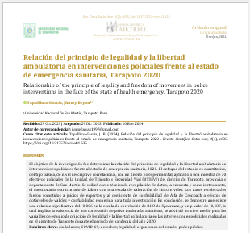Relationship of the principle of legality and freedom of movement in police interventions in the face of the state of health emergency, Tarapoto 2020
DOI:
https://doi.org/10.51252/rcri.v4i1.635Keywords:
citizens, COVID-19, rights, legality, state agencies, public authorities, public powerAbstract
The objective of the research was to determine the relationship between the principle of legality and ambulatory freedom in police interventions in the state of health emergency, 2020. The approach of the study is quantitative, basic, descriptive correlational, with a non-experimental design, applied to a sample of 30 police officers of the Traffic and Road Safety Unit (UTSEVI) of the district of Tarapoto, province and department of San Martin. A survey was used as a data collection technique and a structured Likert questionnaire with a five-level rating scale was used as an instrument. The data collected were subjected to expert judgments and to Cronbach's Alpha reliability coefficient in order to provide them with the validity and reliability required for any research. In conclusion, it was demonstrated that there is a significant relationship of -0.006 on the Spearman's RHO correlation scale, and a p-value of -0.487, which implies the existence of a moderate negative correlation. Likewise, a medium level was observed for the study variables of the principle of legality and ambulatory freedom in police interventions carried out in the district of Tarapoto during the pandemic period of the year 2020.
Downloads
References
Alexy, R. (1993). Teoría de los derechos fundamentales (1st ed.). Centro de Estudios Constitucionales.
Amnistía Internacional. (2020). Represión y COVID-19. Abusos policiales y pandemia (pp. 4–31). https://www.amnesty.org/es/documents/act30/3443/2020/es/
ATV Noticias. (2020). Personas varadas en autopista Ramiro Prialé piden ayuda para regresar a sus ciudades. ATV Noticias. https://www.atv.pe/noticia/personas-varadas-en-autopista-ramiro-priale-piden-ayuda-para-regresar-a-sus-ciudades
Ávila Morales, G. A. (2021). Detención sin derechos: el acceso a la salud en estaciones migratorias antes y durante la pandemia por COVID 19. Desafios Jurídicos, 1(1). https://doi.org/10.29105/dj1.1-2
Carrera Bravo, M. A., Mero Rivera, R. F., Montilla Pacheco, A. D. J., & Becerra Ávila, M. A. (2022). Algunas consideraciones sobre el impacto del COVID-19 en el transporte aéreo de Ecuador. ECA Sinergia, 13(1), 93. https://doi.org/10.33936/eca_sinergia.v13i1.3172
Chávez Hernández, M. V. (2021). Derecho a la salud de personas detenidas o en prisión: la lección de una pandemia. Ciencia Latina Revista Científica Multidisciplinar, 5(5), 7909–7935. https://doi.org/10.37811/cl_rcm.v5i5.882
Ferreira, A., & De Longui, A. L. (2014). Metodología de la Investigación II (1st ed.). ENCUENTRO.
Gonzales Loli, M., Carrasco Salazar, C., & Sanjinez Salazar, J. V. (2020). Limitación de los derechos fundamentales en el estado de emergencia por la pandemia del COVID-19. Cátedra Villarreal, 8(1). https://doi.org/10.24039/cv202081760
Hernández Sampieri, R., Fernández Collado, C., & Baptista Lucio, P. (2014). Metodología de la investigación (6ta ed.). McGraw-Hill Education.
Maitini, J. M. (2018). Detenciones arbitrarias y función policial: una mirada crítica. Derechos En Acción, 9(9). https://doi.org/10.24215/25251678e237
Marruecos Rumí, M. E. (2020). Incidencia del COVID-19 en el derecho humano fundamental a la libertad ambulatoria. Revista de Ciencias Sociales, 26(2). https://doi.org/10.31876/rcs.v26i2.32418
Montoya Cavero, E. J. (2022). Participación de las Fuerzas Armadas ante la declaración de una emergencia sanitaria: Región Ica, 2020. [Centro de Altos Estudios Nacionales]. https://hdl.handle.net/handle/20.500.13097/246
Morales Reategui, M. P. (2020). Eficacia de las sentencias impuestas para la prevención y control del coronavirus en el distrito de Tarapoto. Marzo – junio 2020. [Universidad Nacional de San Martin]. http://hdl.handle.net/11458/3920
Moscol Saavedra, M. Á. (2019). La eficiente aplicación de la detención policial en flagrancia conforme al Artículo N° 259 CPP, en la jurisdicción de la Comisaria PNP Tarapoto periodo Enero –Junio 2017 [Universidad César Vallejo]. https://hdl.handle.net/20.500.12692/39293
Olvera García, J. (2015). Metodología de la Investigación Jurídica [Universidad Autónoma del Estado de México]. https://repositorio.uide.edu.ec/handle/37000/3897
Orbegoso Silva, M. (2020). El Principio de Legalidad: Una aproximación desde el Estado Social de Derecho. IUS ET VERITAS, 60, 198–209. https://doi.org/10.18800/iusetveritas.202001.010
Rivera Ceballos, P., & Rodríguez Chaves, S. (2021). La idoneidad del control inmediato de legalidad para la protección de poblaciones vulnerables en el marco de estados de excepción. Precedente Revista Jurídica, 18, 67–92. https://doi.org/10.18046/prec.v18.4576
Serruto Castillo, A., Rivera Flores, V. A., Vizcarra Tacca, A. F., & Sana Chalco, F. L. (2021). El ejercicio de la ciudadanía en época de la pandemia COVID–19 en la ciudad de Arequipa. Socialium, 5(1), 37–55. https://doi.org/10.26490/uncp.sl.2021.5.1.761
Sisniegas Rodríguez, R. (2020). Imputación subjetiva de tipo dolo eventual en el caso Thomas Restobar. Revista Oficial Del Poder Judicial. Órgano de Investigación de La Corte Suprema de Justicia de La República Del Perú, 12(14), 265–285. https://doi.org/10.35292/ropj.v12i14.177
Solis Curi, E. (2020). Sobre las intervenciones policiales durante el estado de emergencia sanitaria: a propósito del caso discoteca ‘Thomas Restobar’ Pólemos. https://polemos.pe/sobre-las-intervenciones-policiales-durante-el-estado-de-emergencia-sanitaria-a-proposito-del-caso-discoteca-thomas-restobar/

Published
How to Cite
Issue
Section
License
Copyright (c) 2024 Jimmy Bryan Tapullima-García

This work is licensed under a Creative Commons Attribution 4.0 International License.
The authors retain their rights:
a. The authors retain their trademark and patent rights, as well as any process or procedure described in the article.
b. The authors retain the right to share, copy, distribute, execute and publicly communicate the article published in the Ratio Iure Scientific Journal (RCRI) (for example, place it in an institutional repository or publish it in a book), with an acknowledgment of its initial publication in the RCRI.
c. Authors retain the right to make a subsequent publication of their work, to use the article or any part of it (for example: a compilation of their works, notes for conferences, thesis, or for a book), provided that they indicate the source of publication (authors of the work, journal, volume, number and date).






